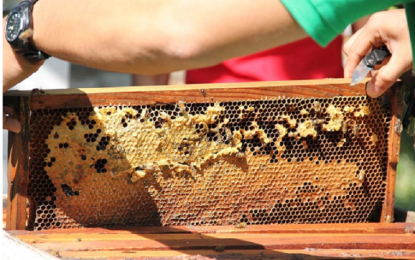
GOLDEN NECTAR. The Department of Agriculture (DA) wants to grow the local beekeeping industry while keeping production in the hands of community-based cultivators. DA Undersecretary Deogracias Victor Savellano on Tuesday (Jan. 2, 2023) said honey production promises huge returns to small entrepreneurs because of the large export market. (Photo courtesy of Regina C. Ongkiko/UPLB)
MAMBURAO, Occidental Mindoro – A successful beekeeping program piloted by the Department of Agriculture (DA) in this province will be replicated nationwide this year to create new livelihood opportunities from honey production.
In an interview on Tuesday, DA Undersecretary Deogracias Victor Savellano said the program was initially launched to help local Mangyan tribesmen generate income while introducing them to contemporary entrepreneurship practices.
The favorable results gleaned from these small-scale ventures have emboldened the department’s leadership to expand the program further, with an eye on supplying the demand for quality honey overseas, he noted.
Towards this goal, Savellano said the DA has partnered with the University of the Philippines-Los Baños (UPLB) on a shared vision to locally produce honey on a commercial scale while maintaining community-based beekeeping operations.
A team has already been established within UPLB to draw up a roadmap for tapping the export market for honey.
“Honey is definitely a high-value agricultural produce. The export potential in honey is huge, but small cottage industries working separately and without government support cannot hope to produce the quantity and quality needed to exploit the global demand. We need an organized national program to cultivate our beekeeping industry,” the DA official said.
He pointed out that among the targeted destinations of Philippine honey is the United Kingdom (UK), as the British royals themselves have proven to be enthusiastic importers of the golden nectar.
Aside from its use as food, honey is also a raw material for other products such as antibacterial soaps, massage oils, lip balm and organic shampoo – all of which command premium prices abroad, it was learned.
Savellano added that his office is now exploring funding options for the expanded beekeeping program through the Bureau of Animal Industry (BAI).
When the program becomes nationally operational, he said the DA will encourage beekeepers to cultivate native species of honey bees, because endemic varieties are more resilient, and renewed interest in them will help in their preservation.
Meanwhile, the undersecretary said the DA is set to establish an accreditation system for local beekeepers to eliminate the black market for queen bees, which has become rampant due to lack of government intervention in the past.
“Queen bee smuggling has been destroying our local industry,” he said. (PNA)
